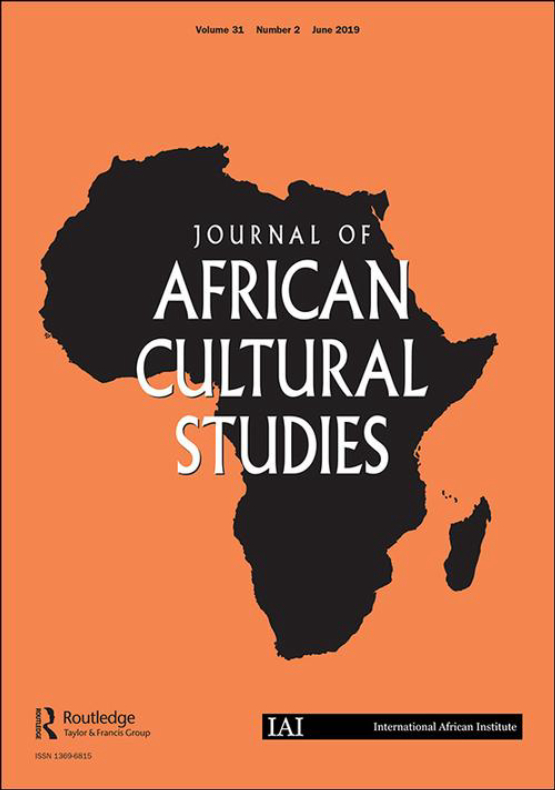Submit a Manuscript to the Journal
Journal of African Cultural Studies
For a Special Issue on
Religious Shopping: Spiritualities, Mysticism, and Markets in Africa
Abstract deadline
Manuscript deadline

Special Issue Editor(s)
Olayombo Raji-Oyelade,
University of Texas at Austin
olayombo.raji@utexas.edu
Religious Shopping: Spiritualities, Mysticism, and Markets in Africa
This special issue edition proposes to explore the rich and complex intersections of religion, spirituality, mysticism, and mercantilism across African societies and their diasporas. It responds to the increasingly visible ways in which religious resources and spiritual practices have become deeply intertwined with capitalist systems, market logics, and commodified modes of self-presentations. It takes seriously the notion that African religious landscapes are not only sites of devotion but also dynamic marketplaces where the “religious shopping” of spiritual goods, sacred performances, and mystical experiences are crafted, exchanged, and consumed. As African religious landscapes evolve in response to global capitalism neoliberalism, the sacred equally rejoins and creates new registers of meaning, value, and performance in the enterprise of religion.
Much of the literature on religious capitalism and neoliberalism in Africa foregrounds Pentecostalism, and this is unsurprising given how the religion’s prosperity gospel and entrepreneurial ethos drives mercantilism. However, this issue purports to expand the conversation to a broader array of religious and mystical economies that are interlocked with Pentecostalism through competing systems and also sustain their individual logics. We ask: how do these faith traditions interact with economic logic, capitalism, commerce, and spectacle? How do consumers understand the connection and respond with the decision to either buy or not buy, shop, or not shop? Our approach is to reflect a growing trend of “religious shopping,” where individuals—now exposed to global markets and globalized media technology—have an ever-expanding range of options and how they exercise them by moving fluidly between religious resources by purchasing, selecting, comparing, and consuming sacred experiences, goods, and affiliations in ways that mirror market-based consumer behaviors.
Scholars such as Jean and John Comaroff (2000), Birgit Meyer (2004), Yong-Kyu Chang (2011), Nimi Wariboko (2018), Marian Burchardt (2020), Abimbola Adelakun (2022; 2024), and Solomon Kgatle (2023) have examined how African religious landscapes are shaped by capitalism, media, and global flows. Comaroff & Comaroff argue that African religious movements sacralize neoliberal logics, while Meyer shows how spiritual experiences are commodified through media and branded aesthetics. Chang explores how spiritual labor is absorbed into South Africa’s market economy, and Wariboko frames Pentecostalism as a theological economy of productivity and desire. Burchardt maps how religious actors navigate marketized urban environments, while Adelakun’s animation theory analyzes how media, spectacle, and embodiment commodify Nigerian Pentecostalism. Kgatle, in turn, highlights how Pentecostal churches operate as commercial enterprises, blending spirituality with corporate strategies of branding and entrepreneurship. Building on these foundational insights, this special issue seeks to shift the analytic gaze from producers to consumers, investigating how African religious adherents—across Christian, Islamic, indigenous, diasporic, and hybrid traditions—navigate spiritual markets as discerning shoppers. Rather than focusing exclusively on pastors, prophets, or institutions, we emphasize how believers browse, evaluate, purchase, and participate in commodified sacred experiences.
We seek original contributions that critically explore how African religious landscapes are being reimagined through commodification, spectacle, and global flows. We invite scholars from across the humanities and social sciences—including religious studies, anthropology, cultural studies, performance, visual arts, and literature—to contribute essays that explore these intersections from diverse methodological and regional perspectives. Contributions might consider how the divine is taken to the market and how shoppers source it as merchandise; how spiritual performance generates value and how such values are contested or haggled; how market ideologies are absorbed, resisted, or reinvented within various African cosmological frameworks by shoppers.
We invite submissions that speak to this emergent field and reflect the regional diversity of the African continent and its diasporas. We are especially interested in contributions that move beyond Pentecostalism to include Catholic, Islamic, Indigenous, Islamic devotional economies, Sufi networks, Afro-diasporic traditions and syncretic religious traditions, and digital-era spiritual influencers. Equally, we welcome studies that look at North, East, Central, Southern, and West Africa with comparative or transnational lenses. Through this lens, we aim to interrogate how religion is consumed, how sacred value is assigned and negotiated, and how the spiritual marketplace is reshaped by neoliberalism, technology, and global capitalism.
Topics may include, but are not limited to:
- Rhetorical skills, moral persuasion, and the logics of spiritual marketing
- Religious marketplaces and intra/inter-continental trade routes of spiritual goods
- Religious “influencers” and digital spirituality
- “Black” magic and black markets
- Technologies of mercantilism in religious and mystical economies
- Professionalization and the economics of charisma
- Religion within the global flows of trade, consumption, and service economies
- The commodification of the papal image and Catholicism.
- Migration, diaspora and spiritual networks
- Exoticization and spiritual tourism
- Intercultural dynamics in spiritual commerce and global flows
- Dynamics of competition and contestation for consumers
- Moral environments of mercantilism
Submission Instructions
Initial abstracts should be no longer than 500 words (excluding reference list and 100 word biography) and sent to the special issue editor, Olayombo Raji-Oyelade (olayombo.raji@utexas.edu), no later than October 30, 2025.
Submitted abstracts will be collated by the Guest Editor and assessed by the journal Editors, who will decide how to proceed with the special issue proposal. If the proposal is accepted, the Guest Editor will aim to inform authors whose abstracts have been accepted by November 15, 2025.
Selected contributors will be invited to submit full research articles, no longer than 8000 words by July 15, 2026. Completed manuscripts should be submitted via Submission Portal and follow the standard journal guidelines found on the Instructions for Authors page. Selected authors should please select Special Issue title from the drop-down menu when submitting their paper.

